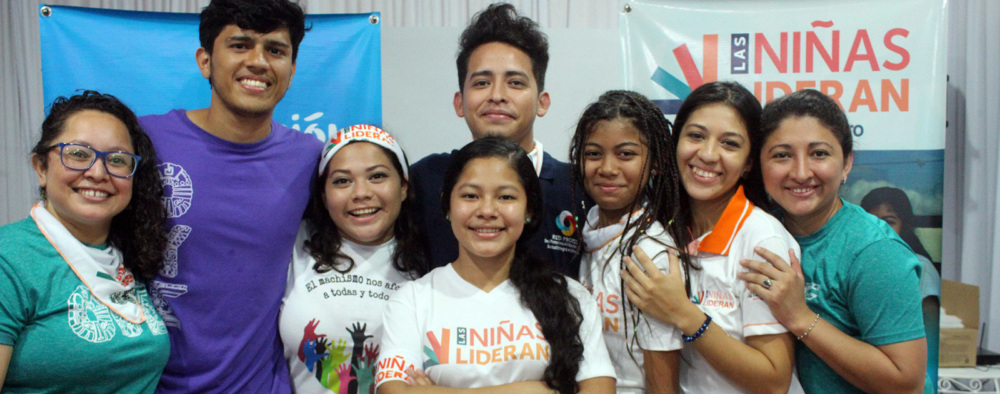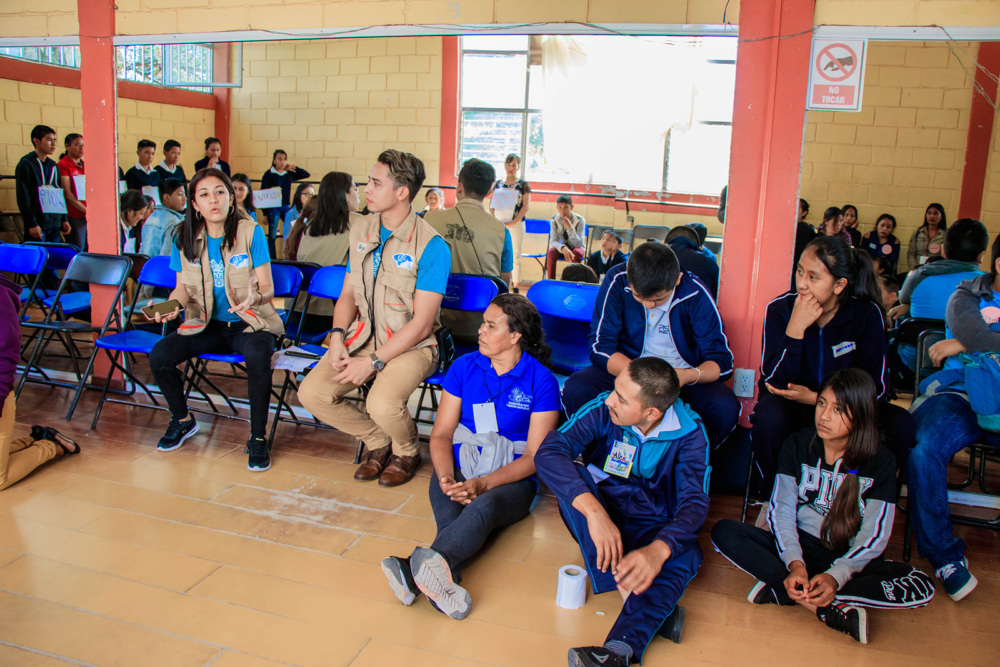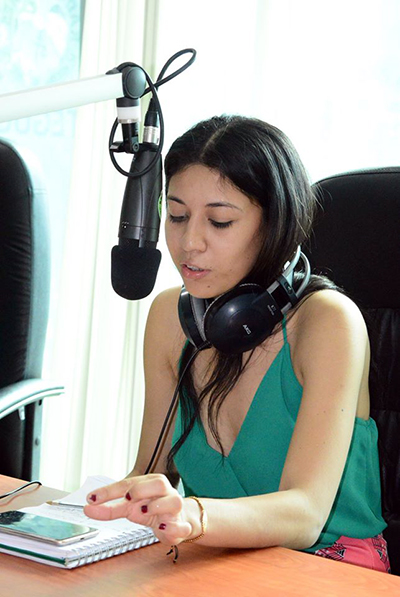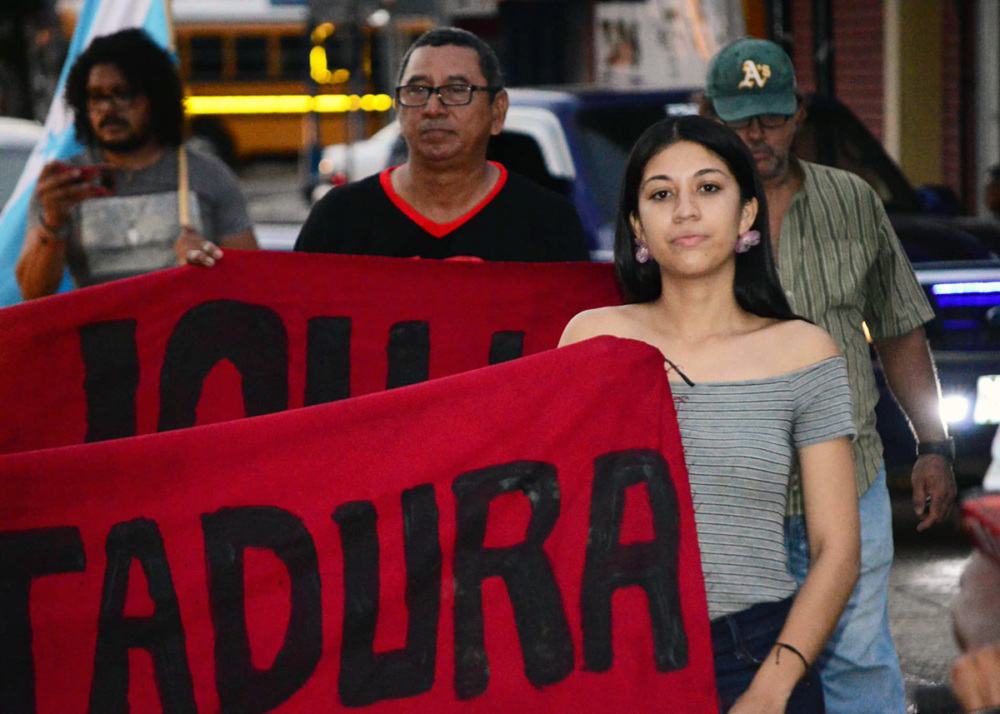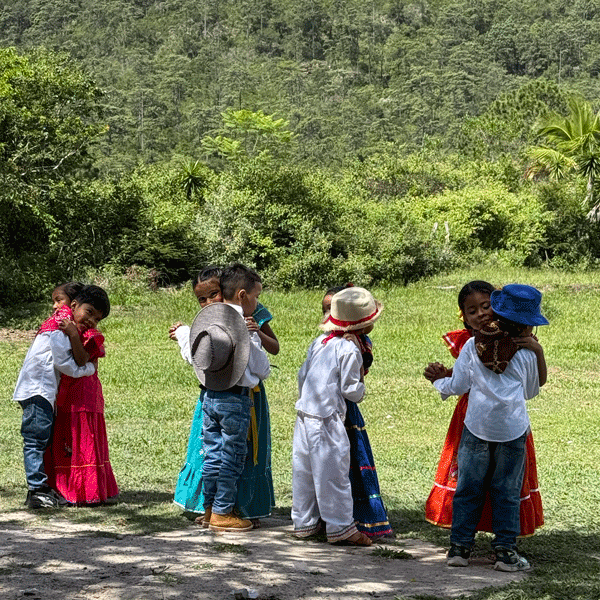
Educación
Educación, justicia de género, poder juvenil
Este blog fue escrito por Keyla Naomy Canales Rodríguez, líder del programa Girls Lead en Organización para el empoderamiento de la juventud (OYE), socio de GFC en Honduras. Esta publicación también está disponible en español.
Ante el miedo hay que elegir: o bien te quedas callada, haces como si no pasara nada y piensas que la violencia es el destino de las mujeres, o bien gritas “¡estoy harta!” y “¡no es justo!” y tratas de cambiar tu vida, por ti y por las demás chicas. Yo elegí la segunda opción.
Mi nombre es Keyla, tengo 24 años y vivo en El Progreso, Honduras. Nuestro pueblo es famoso por tres cosas: un puente llamado La Democracia, que siempre está roto, como nuestro país; los campos de banano; y el intenso calor.
Todavía recuerdo cuando era niña y podía jugar afuera con mis amigas: esa sensación de libertad que sentía, lo feliz que era jugando con mis vecinas. Éramos una comunidad. Una familia.
Luego llegó la mara y todo cambió. Con las maras se extendió el miedo. Ahora, si eras mujer o niña tenías que vivir encerrada. Bajar la mirada si se acercaba un grupo de hombres y aguantar el acoso. Y agradecer cada día sólo por estar viva.
Yo era todavía un niño, pero seguía pensando: Esto no es justo. Esto tiene que cambiar. Así que cuando me hicieron la típica pregunta: ¿Qué quieres ser cuando seas mayor? No tenía dudas en mi corazón: quiero ser abogada, ayudar a los demás, especialmente a las mujeres. Quiero cambiar lo que no es justo.
Para mí, estudiar en la universidad parecía un sueño imposible. No sólo porque éramos pobres, sino porque incluso mi propio círculo social parecía querer condenarme a una vida de servidumbre. “No te preocupes por estudiar, mejor búscate un buen hombre y ten hijos. Si quieres estudiar como pasatiempo está bien, pero recuerda que el plan de vida de una mujer debe ser casarse, tener hijos y ocuparse del hogar”.
¡Sentí tanta rabia! No dejaba de pensar: no es justo. No es justo que ser mujer y ser pobre siempre te ponga en desventaja. Todas tenemos derecho a estudiar, a soñar, a vivir sin miedo. Y yo no vine a este mundo para conformarme ni para complacer a nadie.
Gracias a mi hermana conocí una organización llamada Organización para el Empoderamiento Juvenil (OYE), que me apoyó con una beca para continuar mis estudios. Esto hubiera sido suficiente, pero OYE me dio mucho más. Me dio un propósito en la vida.
En OYE me enseñaron que las jóvenes como yo podemos ser líderes y agentes de cambio en nuestras comunidades. Que nosotras como niñas y mujeres jóvenes podemos unirnos y exigir nuestros derechos. Que tengo derecho a conocer y proteger mi cuerpo. Que llevamos límites y miedos dentro, y que la mejor manera de combatirlos es no quedarnos calladas.
Una de mis primeras actividades en OYE fue coordinar un programa llamado “Deportes en Acción”, que buscaba, a través del deporte, promover relaciones más equitativas entre hombres y mujeres jóvenes para romper barreras y estereotipos de género.
Mucha gente se sorprendió. Hubo incluso algunos que se enojaron.“¿Cómo es posible? Una mujer que coordina deportes y organiza torneos de fútbol. Debería estar enseñando cocina o voleibol; esos son asuntos de mujeres. Se va a hacer daño, pobrecita”.
No es justo. Una y otra vez, no es justo. Pero con logros les demostré que las mujeres pueden practicar cualquier deporte y liderar eventos deportivos. Incluso mejor que los hombres.
Pasó el tiempo y me ofrecieron coordinar un nuevo programa llamado Las Niñas Lideran. El objetivo era organizar un grupo de niñas para que reflexionaran sobre la violencia de género que viven a diario y sobre su salud sexual y reproductiva. Todas estas reflexiones las convertimos en recomendaciones de política pública, pues queríamos que las voces de las niñas y jóvenes fueran incluidas en las decisiones que toma el gobierno y que afectan nuestros cuerpos y vidas.
Este programa cambió mi vida. Pude aprender mucho de ellas… a enojarme y conmoverme con sus historias de acoso. A indignarme por la violencia que sufren todos los días, a maravillarme con su claridad y su capacidad para tomar decisiones. A admirar su tenacidad y coraje. Estas chicas han sido las mejores maestras que he tenido.
Me vi reflejada en ellos y revivió la violencia que viví. Volví a sentir rabia. Volví a sentir indignación. Pero ahora sabía que no estaba sola y eso me dio mucha fuerza. Había recuperado mi comunidad. Había encontrado una familia.
A pesar de los tiempos difíciles, nunca nos permitimos perder la esperanza. Nos sosteníamos y recordábamos que la alegría hay que defenderla. Que sin baile, sin juegos, sin creatividad, no podemos cambiar el mundo. Si dejamos de reír, ya hemos perdido.
Fue en ese espacio donde comencé a reconocerme como una joven mujer feminista. Ese era mi propósito. Había perdido el miedo.
Lo sacamos a la calle. Sin pedir permiso. Fuimos a escuelas, parques, centros gubernamentales. Gritamos una y otra vez: “¡Ya estamos hasta el cuello! No es justo. No queremos ni merecemos vuestra violencia y discriminación. Y no estamos dispuestos a aceptarla”.
Hablando, gritando, reclamando, les obligamos a escuchar. Y el año pasado, presentamos un proyecto de política pública de salud sexual integral al gobierno municipal. Nuestra rabia se convirtió en acción. Nuestra indignación se convirtió en propuesta.
Reflexionamos juntas. Aprendemos y enseñamos. Lideramos. Demostramos a todos que las mujeres son capaces de hacer grandes cosas. Y al hacerlo, transformamos el mundo.
Y esto es sólo el comienzo.
Aún queda mucho por hacer: debemos seguir creando espacios para que hombres y mujeres reflexionemos sobre la violencia que vemos, vivimos y reproducimos y nos demos cuenta de que tenemos el poder de cambiar y mejorar nuestras comunidades.
La violencia nos afecta de manera diferente. Por eso es importante dialogar. Reconocer que, aunque somos diferentes, tenemos los mismos derechos.
Ahora soy abogada y, aunque sigo vinculada a OYE de muchas maneras, trabajo activamente en una organización de derechos humanos. Cumplí el sueño de mi vida.
OYE me enseñó que tengo voz, y que esa voz vale mucho y puede inspirar a otros. Que siempre hay que dar ejemplo y pensar siempre en el bienestar colectivo. Y que, si es necesario, hay que gritar. Gritar hasta que alguien más te escuche.
Nunca más. Nunca más tendrás el consuelo de mi silencio. Una y otra vez seguiré diciendo: "No es justo, esto tiene que cambiar".
Ése es el primer paso para hacer de este mundo un lugar mejor.
La Organización para el Empoderamiento Juvenil (OYE) está creando una generación de jóvenes líderes educados en Honduras que están comprometidos con mejorar sus comunidades. Su competitivo programa de becas brinda a jóvenes prometedores el apoyo que necesitan para graduarse de la universidad. Mientras tanto, los becarios de OYE involucran y educan a sus pares a través de proyectos dirigidos por jóvenes que incluyen una estación de radio, una revista, artes públicas y deportes en equipo.
La iniciativa Girls Lead apoya a líderes de todo el mundo, empoderando a las adolescentes para que defiendan y ejerzan sus derechos.
La iniciativa está conformada por 20 mujeres jóvenes que participan en círculos de diálogo para promover la discusión abierta y la reflexión sobre temas que impactan en su salud y bienestar. Las participantes también abogan por una educación sexual integral en los centros educativos locales.
A través de este programa, OYE busca actualmente la aprobación de una política pública municipal relacionada con la educación integral en sexualidad en las escuelas, con el objetivo de reducir la tasa de embarazo adolescente de El Progreso, una de las más altas del país.
